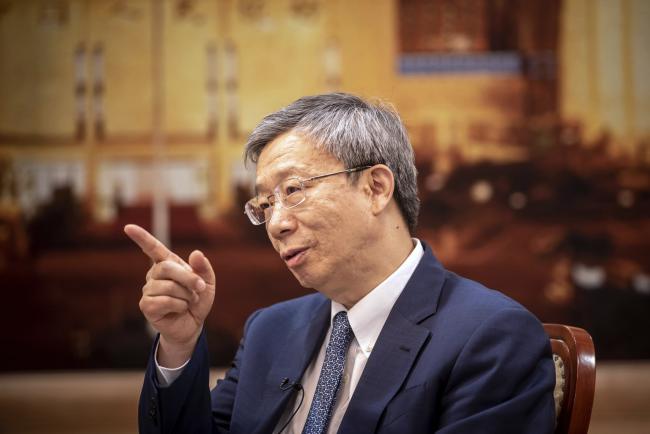(Bloomberg) -- People’s Bank of China Governor Yi Gang said last week that no specific level for the yuan is important, and indicated confidence it will continue to be “relatively strong” once the noise of the trade war subsides.
“There is obviously a link between the trade war and the movements of renminbi,” Yi said in an exclusive interview in Beijing, using the official term for China’s currency. “Recently, it’s a little bit weaker, because of the tremendous pressure from the U.S. side.”
Yi said that yuan’s depreciation has come thanks to market forces -- it is “basically determined by supply and demand of the market force, so that it’s basically a market mechanism.” Policy makers including President Xi Jinping himself have emphasized that China won’t pursue a policy of currency depreciation that hurts others.
Some market participants have speculated that China has sought to prevent the yuan from sliding past 7, in part out of concern about a resumption of the kind of capital outflows in 2015-16 that forced officials to draw down the nation’s foreign-exchange reserves. During trade tensions last year, the yuan approached but didn’t drop past 7.
Stabilizing Force
The offshore yuan was at 6.9432 as of 7:43 a.m. Hong Kong time, retaining losses from Friday in the wake of Yi’s remarks.
“I don’t think along this mathematical scale, any number is more important than other numbers,” Yi said when asked if there was a red line for the yuan. He also said that “a little flexibility” in the yuan was good for the economy, as it acts as stabilizer for the balance of payments.
Goldman Sachs Group Inc (NYSE:GS). strategists are among those seeing a break of 7 per dollar, though they anticipate China will tap the brakes to ensure against disorderly, one-directional trading. “Any move through 7.00 is likely to happen in a managed and gradual fashion, with steps backwards and forwards across” that level, Goldman strategists led by Zach Pandl wrote in a June 8 note.
A cheaper currency typically helps to bolster export competitiveness, and the yuan’s 7 percent-plus decline against the dollar over the past year has helped to offset some of the impact of President Donald Trump’s tariff hikes on Chinese goods.
“The People’s Bank of China, is already pretty much not intervening in the foreign-exchange market for a long time, and I hope that this situation will continue -- not intervene,” Yi said in the interview.
The PBOC chief also said that while “the trade war would have a temporary depreciation pressures on the yuan, but you see after the noise, renminbi will continue be stable and relatively strong compared to emerging market currencies, and even compared to convertible currencies, renminbi is a very strong currency.”
Among the assets in China’s toolkit to combat the impact of the trade war are monetary and fiscal policy, and job training, Yi said. As for the exchange rate, “we will continue to have this market-oriented mechanism,” he said.
“I’m very confident renminbi will continue to be stable at a more or less equilibrium level,” the governor said. He later repeated those comments at the Group of Twenty meeting in Japan over the weekend.
(Adds Goldman analysis in seventh paragraph.)
To contact Bloomberg News staff for this story: Christopher Anstey in Tokyo at canstey@bloomberg.net;Tom Mackenzie in Beijing at tmackenzie5@bloomberg.net;Haze Fan in Beijing at hfan40@bloomberg.net
To contact the editors responsible for this story: Christopher Anstey at canstey@bloomberg.net, ;Jeffrey Black at jblack25@bloomberg.net, Sharon Chen, James Mayger
©2019 Bloomberg L.P.
